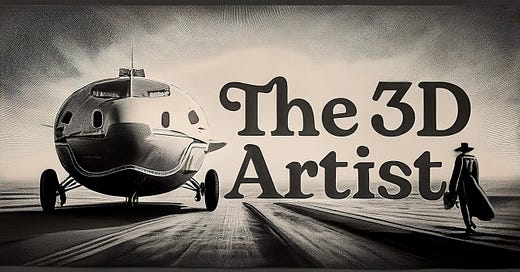In one of our recent 3D Artist Community hangouts, we had a thought-provoking conversation around a question that’s as timeless as it is difficult to answer: when is the best time to leave a job?
While everyone had their personal experiences and thresholds for change, it became clear that people generally fall into two distinct groups. Some are more risk-tolerant and leave jobs when things don’t align with their long-term vision, while others seek stability and are willing to stay longer, even in less-than-ideal situations. The thing is, there’s no definitive right or wrong approach—deciding when to leave is always murky.
The RomCom Principal
This ambiguity is what I like to call the RomCom Principle.
In simple romantic comedies, the writers often face a dilemma: how do you craft a story where one or both characters are in a current relationship, but you want the audience to root for them to leave that relationship for someone new?
The solution is usually to make the existing partner awful—shallow, insensitive, selfish, or just plain annoying. They have to be so unlikable that there’s no gray area, making the decision easy for the characters and the audience. Otherwise, if the choice is unclear, the audience gets divided—some rooting for the breakup, others for staying together.
But in the best romcoms, the choice gets a little murkier. In When Harry Met Sally, my favorite RomCom, Harry and Sally discuss whether Ingrid Bergman should have gotten on the plane at the end of Casablanca. Harry argues that she should stay in Casablanca with Rick while Sally argues she
HARRY: ...he wants her to leave that's why he puts her on the plane.
SALLY: I don't think she wants to stay.
HARRY: Of course she wants to stay. Wouldn't you rather be with Humphrey Bogart than the other guy?
SALLY: I don't want to spend the rest of my life in Casablanca married to a man who runs a bar. I probably sound very snobbish to you but I don't.
HARRY: You'd rather be in a passionless marriage.
SALLY: And be the first lady of Czechoslovakia.
HARRY: Than live with the man you've had the greatest sex of you life with, and just because he owns a bar and that is all he does.
SALLY: Yes. And so would any woman in her right mind, woman are very practical, even Ingrid Bergman, which is why she gets on the plane at the end of the movie.
Life is a good romantic comedy where decisions live in the gray area. You are either in the camp that Ingrid Bergman should have gotten on the plane or she should have stayed in Casablanca.
The Two Approaches: Stay or Go?
The “Get on the Plane” Group (Low Risk Tolerance)
These individuals value stability and longevity. They’re willing to endure a less-than-ideal job if it means they can remain in a familiar environment. I count myself among these people. In fact, I haven’t quit a job since I was 18 years old and an assistant manager at Johnny Rockets. And even then, it took extreme circumstances for me to leave.

My coked-up general manager was forging my signature on documents, trying to frame me for stealing money from the safe. That is what it takes for me to leave a job. A pure RomCom villain.
For this group, the pros are clear. Stability allows you to plant roots, build a long-term financial plan, and stay close to family or personal goals. But there are downsides too. One of the biggest is that you’re likely leaving money on the table by staying in the same job for too long. Even at companies that offer regular raises, your salary typically won’t keep pace with the market value you could command by moving elsewhere. There’s also the risk of getting stuck in a bad situation—whether it’s a toxic boss or a dead-end role—because you’re more focused on stability than your own career growth.
The “Stay with Rick in Casablanca” Group (High Risk Tolerance)
On the other hand, there are those who are more willing to take risks. They’ll leave a job if it doesn’t align with their values, or if they see a better opportunity elsewhere. These individuals often advance more quickly in terms of job title and salary because they’re continually pushing themselves into new, more challenging roles.
But this approach isn’t without its challenges. Constant job changes can mean frequent relocations, which can be exciting in your 20s but become more difficult later on, especially if you want to start a family or settle down. Moving from one job to the next can also hurt your chances with companies that value long-term commitment. Hiring managers might view a resume filled with short-term roles as a red flag and question whether you’re the right cultural fit for their company.
The Current Job Market
Right now, we also have to acknowledge the economic reality. The job market is tough, and many people are out of work not by choice, but by circumstance. With so many looking for jobs, those who are employed are holding onto their roles even tighter. The scarcity of opportunities makes it even harder for those seeking new roles.
For those who are between jobs, this may be a moment of forced reflection. It’s a chance to reassess where you are on the risk tolerance spectrum and think about whether this is an opportunity to change your career direction. While it’s challenging out there, transitions like this can often push us toward growth.
Final Thoughts: A Personal Decision
Ultimately, there’s no clear answer to the question of when to leave a job. It’s a deeply personal decision, influenced by your risk tolerance, long-term career goals, and current life circumstances. Whether you lean toward stability or risk-taking, it’s important to periodically step back and evaluate where you are. Are you staying because it aligns with your career goals, or are you staying out of fear? Are you leaving for a better opportunity, or does the grass just look greener elsewhere?
At the end of the day, what’s most important is that your choices reflect your values and career aspirations. This is an ongoing conversation, and I encourage you to share your stories or advice on when you think it’s the right time to move on from a job in the comments below.
Let’s keep the discussion going!
The 3D Artist Community Updates









Join our thriving community and gain access to over 20 AMA sessions with top industry professionals! Explore insightful recordings, detailed session notes, and get ready for even more exclusive events coming soon. Don’t miss out—become a part of the conversation today!
3D News of the Week
Meta’s Orion Glasses - The Verge
Check Out Early Version of Sixth Sister from Black Myth: Wukong - 80.lv
Editable Gaussian Splatting in Blender - Radiance Fields
Discover Browzwear 2024.2 Edition - Browzwear
HTC VIVE Launches VIVE Focus Vision XR Headset for Enterprises and High-end Gaming - Vive
3D Merch is here!
3D Tutorials
3D Job Spreadsheet
Link to Google Doc With A TON of Jobs in Animation (not operated by me)
Hello! Michael Tanzillo here. I am the Head of Technical Artists with the Substance 3D Growth team at Adobe. Previously, I was a Senior Artist on animated films at Blue Sky Studios/Disney with credits including three Ice Age movies, two Rios, Peanuts, Ferdinand, Spies in Disguise, and Epic.
In addition to his work as an artist, I am the Co-Author of the book Lighting for Animation: The Visual Art of Storytelling and the Co-Founder of The Academy of Animated Art, an online school that has helped hundreds of artists around the world begin careers in Animation, Visual Effects, and Digital Imaging. I also created The 3D Artist Community on Skool and this newsletter.
www.michaeltanzillo.com
Free 3D Tutorials on the Michael Tanzillo YouTube Channel
Thanks for reading The 3D Artist! Subscribe for free to receive new posts and support my work. All views and opinions are my own!











Michael, thanks for flushing this thought and idea out more! I really appreciated reading this! As much as I ‘say’, I like change and can tolerate a healthy amount of risk, lol 😋, I think I fall into the low risk category when it comes to this as well, if I’m honest with myself!
I find this article intriguing because it highlights the complexities of dealing with the prospect of leaving a job. I can relate to those who choose to remain in a familiar job, hoping that things will improve. Next year marks my 10th year in the same industry. During this time, I've only experienced internal promotions and job changes within the same company. However, in recent years, I've faced numerous setbacks, leading me to pursue online certifications and apply for jobs elsewhere. The challenge I face is that I don't feel adequately prepared for the gaming/film/commercial industry, and conversely, if a studio appreciates my current experience, I have to navigate the current state of those industries. In my current field, although job stability hasn't been ideal, it has been consistent. I'm hoping to gain clarity by the end of the year as I head into my one-month sabbatical in December.